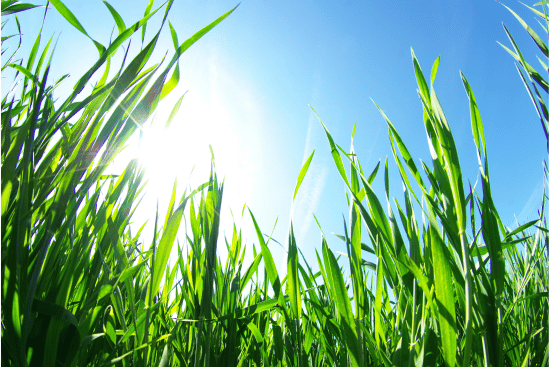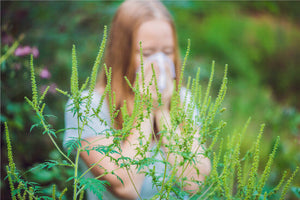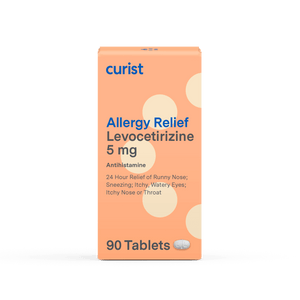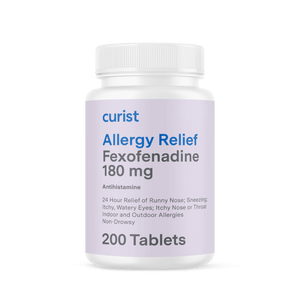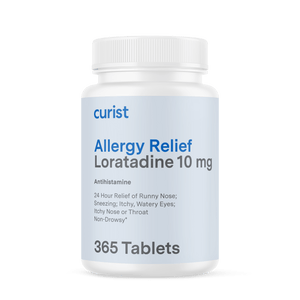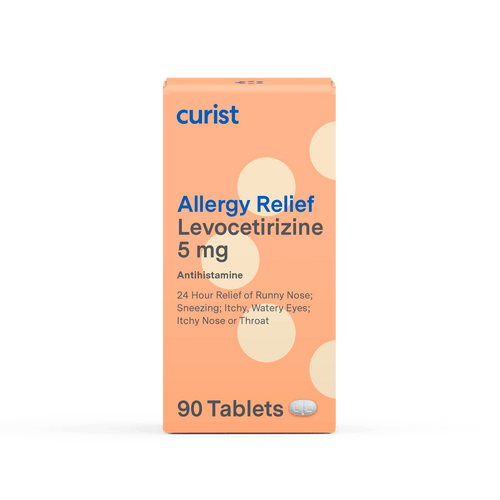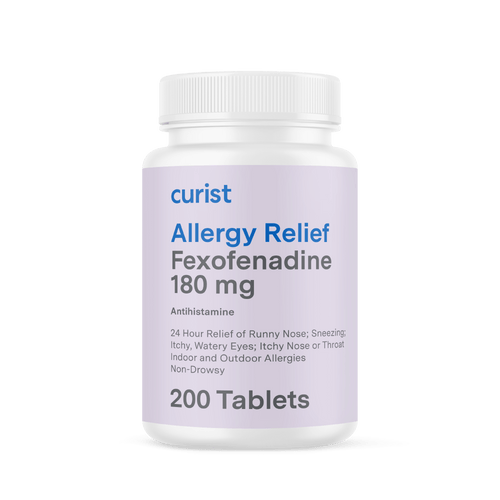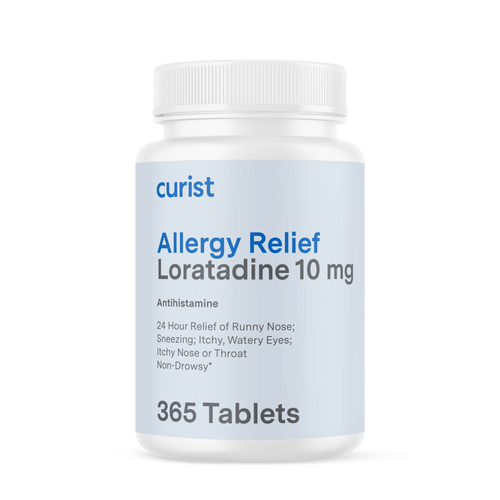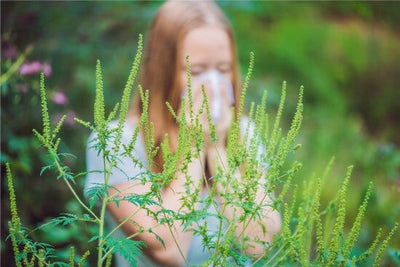Curist delivers over-the-counter medicines to your door at a fraction of the price of traditional brands. We hope everyone stays safe and healthy during this time.
We love the smell of fresh-cut grass, but what if we can’t stand the allergies? Read more to learn how we can still enjoy the great outdoors without the pesky grass allergy symptoms.
How Do I Know If I Am Allergic to Grass Pollen? What Are the Symptoms of Grass Pollen Allergy?
Did you know that grass releases tiny pollen grains, just like many other plants? Even though grass pollen is microscopic, small amounts in the air are still enough to trigger your body’s immune system and create grass allergy symptoms. Grass allergies may cause symptoms like itchy eyes, watery eyes, runny nose, sneezing, itchy throat, skin rashes, and or hives. Some people also refer to a grass pollen allergy as hay fever or seasonal allergic rhinitis. If you suspect that you are allergic to grass pollen, visit your physician or an allergist so they can run several grass allergy tests to identify the exact source of your allergies.
What Types of Grass Cause Grass Allergies? Are Some Types of Grass Pollen Worse for Allergies than Others?
There are many types of grass that can cause allergies and your grass allergy symptoms can be triggered by one or several types of grass at a time. Depending on your location and the types of grass and plants that thrive there, your grass allergies may even change throughout the year. Commonly grasses like bermuda grass, timothy grass, ryegrass, orchard grass, kentucky grass, johnson grass, redtop grass, and sweet vernal grass can all trigger allergy symptoms such as a cough, stuffy nose, or itchy eyes. Even though it is less common, grass allergies can also cause skin rash or hives. Several things can make your grass allergies worse such as dry, windy days and unmowed lawns since these settings can increase the release and movement of grass pollen. If you are allergic to grass pollen, some fruits and vegetables may have similar proteins that may also trigger an allergic reaction (known as oral allergy syndrome).
How Long Does Grass Pollen Allergy Last?
Allergies to dust mites, grass, and ragweed are actually more common than you think, affecting 20% of Americans, according to The New York Times. Grass pollen levels are typically the highest from May to late August, so your grass pollen allergy can last throughout that time. The National Allergy Bureau records grass pollen counts in most regions, which can help you figure out when you should limit your time outdoors in order to reduce exposure to grass pollen.
Why is My Grass Pollen Allergy Worse at Night?
One possible reason that your grass pollen allergy is worse at night is that your bedding and pillow can trap grass pollen that you and your pets bring indoors. Spending time at home at night may also trigger other indoor allergies, like dust mite allergies, mold allergies, or pet allergies, which can make your allergy symptoms worse at night.
Because grass pollen can stick to you and your clothing after outdoor activities, we encourage you to change and wash your clothing, then shower immediately to remove grass pollen and reduce the amount of grass pollen in your home. If your pets go outdoors often, clean them off with a towel and limit their time in your bedroom to make sure they are not tracking grass pollen indoors or on your beds. If you need additional relief for your grass allergy symptoms at night, you can try an oral antihistamine such as Curist Allergy Relief (levocetirizine).
Do I Have Hives or Grass Pollen Allergy? What is the Difference Between Grass Allergy vs Hives?
Grass allergy, or grass pollen allergy, can cause many allergy symptoms including hives. A grass pollen allergy causes symptoms like itchy eyes, watery eyes, runny nose, sneezing, itchy throat, skin rashes, and or hives. Hives are typically presented as raised, red or skin-colored bumps that turn white in the middle when you press down on them. Hives typically look like welts on the skin, larger than the size of a quarter across large areas on the body. These welts may disappear after a few hours, change shape, and/or reappear somewhere else on your body. Note that in addition to grass allergies, hives can be triggered by many things such as other plant pollen, medications, food, pollen, pet dander, alcohol, exercise, stress, infection, or heat. If you notice hives that continue over the course of several days, you should visit your doctor or an allergy specialist to help identify the cause. If you have dizziness, difficulty breathing, or swelling inside the throat, tongue, eyes, or lips with hives, seek immediate medical attention as these can be signs of anaphylaxis, a serious life-threatening allergic reaction.
Do I Have Hay Fever or Grass Pollen Allergy? Is Grass Allergy the Same as Hay Fever?
Grass allergy is a type of hay fever. Hay fever, commonly known as allergies, can be caused by several allergy triggers, like animal dander, dust, or plant pollen, like grass pollen. One specific type of hay fever is grass allergy. Grass allergies may cause uncomfortable symptoms such as sneezing, red or watery eyes, runny or stuffy nose, or nasal congestion. If you know you have hay fever or grass allergies, you can use oral antihistamines such as Curist Allergy Relief (levocetirizine) each day for 1 to 2 weeks ahead of when your symptoms usually begin to prevent allergy symptoms. It will take time to find the best antihistamine for you, so if you need any assistance, consult with your local pharmacist, physician or allergist.
Do I Have Ragweed or Grass Pollen Allergy? What is the Difference Between Grass Allergy vs Ragweed Allergy?
Both ragweed allergy and grass allergy are allergies caused by specific plant pollen, ragweed pollen or grass pollen respectively. Both ragweed allergies and grass allergies are a type of seasonal allergies (hay fever). Symptoms of ragweed and grass pollen are very similar so it can be difficult to tell whether you have ragweed allergies or grass allergies. Both grass allergies and ragweed allergies can cause symptoms like coughing, itchy eyes, watery eyes, runny nose, sneezing, itchy throat, skin rashes, and hives.
One clue to tell the difference between grass allergy versus ragweed allergy is the timing of your allergy symptoms. Ragweed is a type of plant with small green flowers that release large amounts of pollen. Ragweed pollen typically starts in the fall, starting in August and lasting until the beginning of winter. Grass pollen levels tend to peak in May and last through August.
Do I Have Grass Pollen Allergy or Eczema?
To tell the difference between grass pollen allergy or eczema, look at your symptoms. Grass pollen allergies do not usually cause skin rashes or hives, which are common symptoms of eczema. A grass pollen allergy will typically lead to symptoms around your face area (including sneezing and watery eyes), whereas eczema can affect different parts of your skin (e.g. around your eyes, hands, inside of elbows, feet, and back of knees) over a long period of time. One distinct feature of eczema is that you may see itchy red or gray patches of your skin. Note that for people with both allergies and eczema, allergy symptoms can trigger an eczema flare-up. If you need help managing your eczema or grass allergies, make sure to visit your healthcare provider.
How Do You Treat Grass Allergies?
The best way to treat grass allergies is to prevent exposure to grass pollen if at all possible. There are many to help manage your exposure to certain grass types and reduce your allergy symptoms, for example:
- Check your local forecast and pollen count: If your location indicates a high grass pollen level, try to limit your time outside and close your windows on windy, summer days. If you do have to venture into the great outdoors, wear a hat and mask to reduce grass pollen exposure.
- Consider a lawn makeover: If possible, you can remove the grass in your backyard and replace them with allergy-safe options such as irish moss or perennial ryegrass and tall fescue since these only release pollen when they grow beyond 12 inches.
- Keep the pollen outside: Close your windows before mowing the lawn and during pollen season. If you have pets, wipe them with a towel before they come inside. Removing your shoes before walking indoors can also help keep pollen outside as well.
- Wash the pollen away: After outdoor activities, change and wash your clothes, then bathe and shampoo your hair to make sure you don’t bring pollen into your bed. You can also wash your bedding weekly in hot, soapy water.
- General housekeeping: Drying your clothes inside rather than using an outdoor clothesline and vacuum weekly can help reduce your allergies symptoms at home.
There are also several over-the-counter and prescription medications available to help control your grass allergy symptoms. It may take some time to find the one that works best for you, but you can always consult with a local pharmacist for more help and guidance.
What is the Best Medicine for Grass Pollen Allergy Treatment?
Some of the best medicines for treating grass pollen allergies including oral antihistamines such as Curist Allergy Relief (levocetirizine) and intranasal steroids like Curist Allergy Nasal Spray (fluticasone propionate 50 mcg). If you can anticipate your grass allergy symptoms before the pollen season begins, and take these medications as directed before the allergy season starts, and they work even better!
There are other over-the-counter options to help relieve your grass allergy symptoms, but the second-generation antihistamines (like Curist Allergy Relief (levocetirizine) are usually best as they provide allergy relief without causing any drowsiness. Other options include loratadine, cetirizine, and fexofenadine. Prescription options from an allergy doctor to treat grass allergies include allergy shots or allergy drops, that may help train your immune system and ease your grass allergies.
